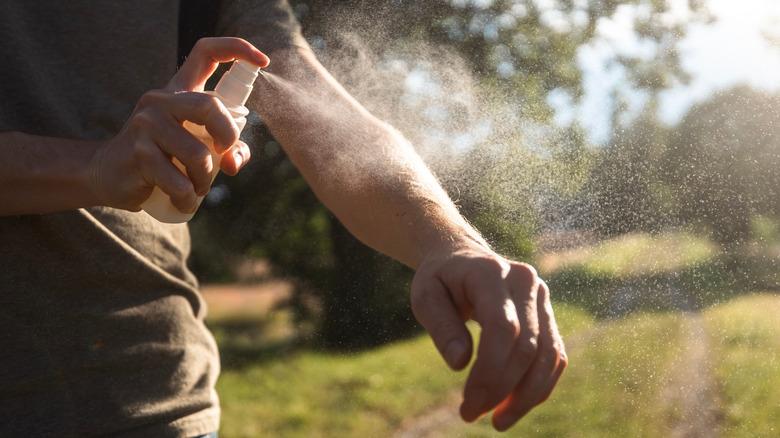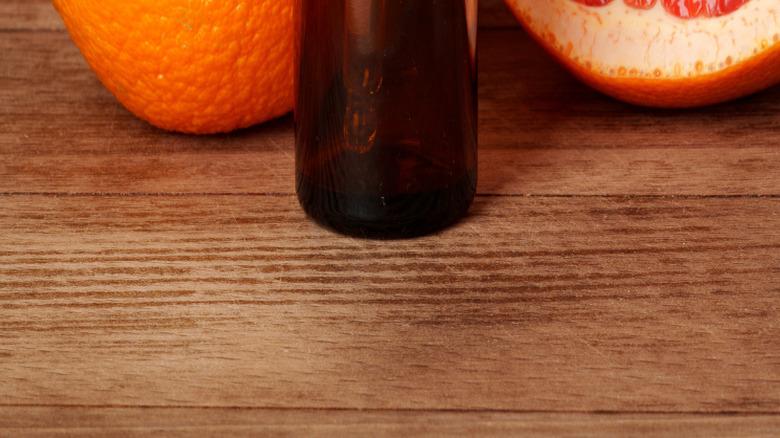The Popular Fruit In Your Kitchen That Can Help Repel Pesky Mosquitoes
The world's deadliest animal? Forget killer bees, alligators, or humans. Try to forget those nightmare images in Jaws. The world's deadliest animal is the mosquito, killing 750,000 people a year. They are nothing to trifle with, and repelling them not only saves you from itchy bug bites; it potentially saves your life. Many people grow plants that repel mosquitoes or slather themselves with commercial repellents, but one popular fruit contains a compound that's proven to be just as powerful a repellent without you having to worry about what's in the repellent's ingredients. Mosquitoes are increasingly developing resistance to chemical insecticides, including the commonly used permethrin. But mosquitoes have yet to outwit the humble grapefruit, which contains a powerful compound called nootkatone, a natural mosquito repellent and insecticide.
There are a number of essential oils that can keep pesky mosquitoes away, but grapefruit oil is in a league of its own. In 2020, the US Environmental Protection Agency (EPA) registered nootkatone as an approved mosquito repellent, stating that it gave people several hours of protection from mosquitoes. (It also works against ticks!) As a repellent, nootkatone disrupts mosquitoes' sensory systems. Sprayed directly on them at a higher dosage, it kills them as well. Sprayed on humans, by contrast, nootkatone has been found to be safe, non-toxic, and non-irritant to skin. In fact, it's likely that you've already been exposed to nootkatone with no harmful effects. Nootkatone is an additive found in many soft drinks, bath bombs, hair conditioners, and wide variety of other foods and cosmetics.
How to use grapefruit oil to repel mosquitoes
You can purchase grapefruit as an essential oil, though it may be easier to simply use a grapefruit yourself. Just be sure it's safe for you, as grapefruit (even just used topically) can react with certain medications. If using grapefruit essential oil, be aware that it will need to be diluted with a carrier oil like coconut oil or olive oil before you rub it on your skin or clothes. While nootkatone has been found to be safe, grapefruit oil contains other compounds as well, so it's best to handle undiluted grapefruit oil with gloves while diluting it. Nootkatone is found in the grapefruit skin as well as in the pulp, so use the skin, which doesn't contain the same level of sticky sugars that the pulp has. Grapefruit oil isn't greasy, and it dries very quickly.
If your skin is sensitive or you just don't want to be seen in public rubbing a grapefruit on yourself, you can also rub the peels or diluted oil onto your clothes. Applied to clothing, nootkatone provided more repellency than Repel Permanone, a commercially permethrin-based repellent. One study found that nootkatone was less effective as an insecticide (rather than as a repellent) than permethrin, however, so if, for example, you're trying to kill mosquito larvae in standing water, you might opt for different natural solutions. Still, grapefruit oil is a proven repellent, and as the US Centers for Disease Control and Prevention (CDC) states, "[t]he best way to protect yourself and your family from mosquito and tick bites is to use an EPA-registered insect repellent." What a relief to discover that something as common as a grapefruit can ward off one of humanity's greatest enemies.

